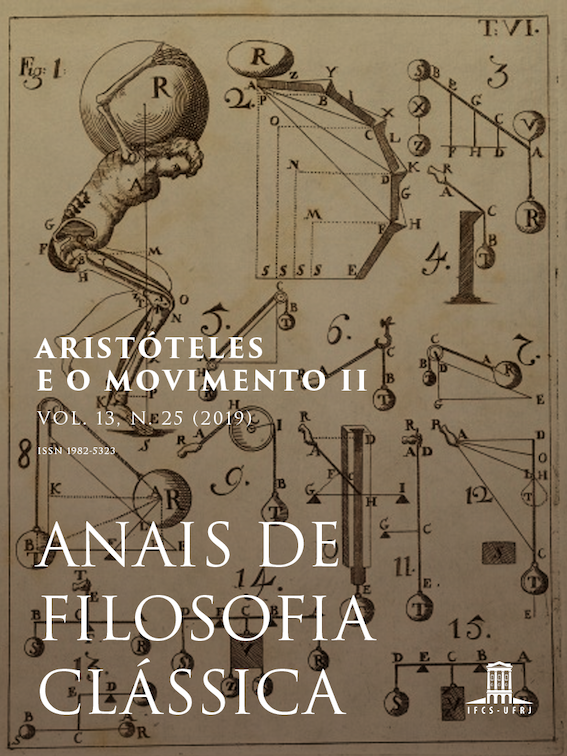Sobre a tradução de enérgeia e entelékheia em Física III, 1-3
DOI:
https://doi.org/10.47661/afcl.v13i25.27771Palabras clave:
Aristóteles, movimento, potência, ato, traduçãoResumen
Em se tratando da questão do movimento em Aristóteles, o par conceitual “potência e ato” não é apenas importante, ele praticamente esgota a própria definição de movimento, que, nos três primeiros capítulos do livro III da Física, passagem que se pode apelidar de "Tratado do Movimento", é definido como "o ato do ente em potência enquanto tal" (hetoû dynámei óntos entelékheia, hê(i) toioûton). Nessa definição a palavra grega traduzida por "ato" é entelékheia, mas ao longo das 161 linhas do "Tratado do Movimento" Aristóteles emprega 19 vezes o termo entelékheiae 21 vezes o termo enérgeia, sem fazer uma distinção clara – como de resto alhures também não faz – levando alguns tradutores à resignação diante de uma quase sinonímia e à tradução quase automática de ambos os termos gregos por um único termo do vernáculo, como "ato", “atualidade”, “efetividade”. Como traduzi-los afinal?Descargas
Citas
ARISTOTELIS Physica. Recognovit brevique adnotatione critica instruxit W. D. Ross. Oxford: Oxonii e Typographeo Clarendoniano, 1992.
ARISTOTELIS Metaphysica. Recognovit brevique adnotatione critica instruxit: W. Jaeger. Oxford: Oxonii e Typografeo Clarendoniano,1985.
ARISTOTLE – Metaphysics. Ed. e trad. Hugh Tredennick. Harvard University Press, 1933 (Loeb Classical Library).
ARISTÓTELES – Metafísica. Ed. Trilíngüe por V.G. Yebra. Madrid: Gredos, 1970.
ARISTÓTELES – Física, I-II. Trad. Lucas Angioni. Campinas. Editora da Unicamp, 2009.
ARISTOTE – La Physique. Trad. A. Stevens. Paris: Vrin, 1999.
ARISTÓTELES – Física. Trad. Guillermo R. De Echandía. Madrid: Editorial Gredos, 1995-2002.
PELLEGRIN, Pierre – Le vocabulaire d’Aristote. Paris: Ellipses, 2009.
REALE, Giovanni – Metafísica III Sumário e comentários. São Paulo: Loyola, 2002.


